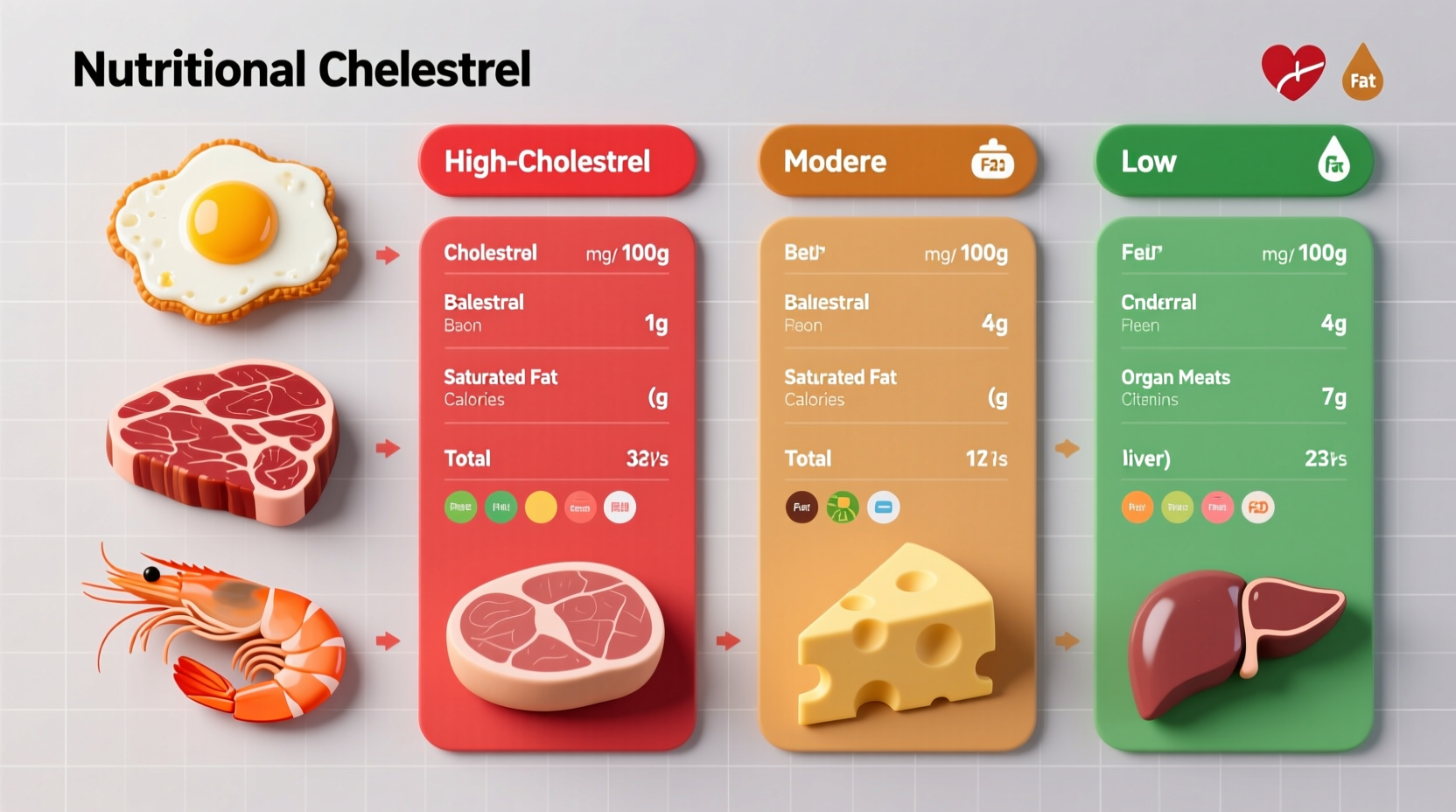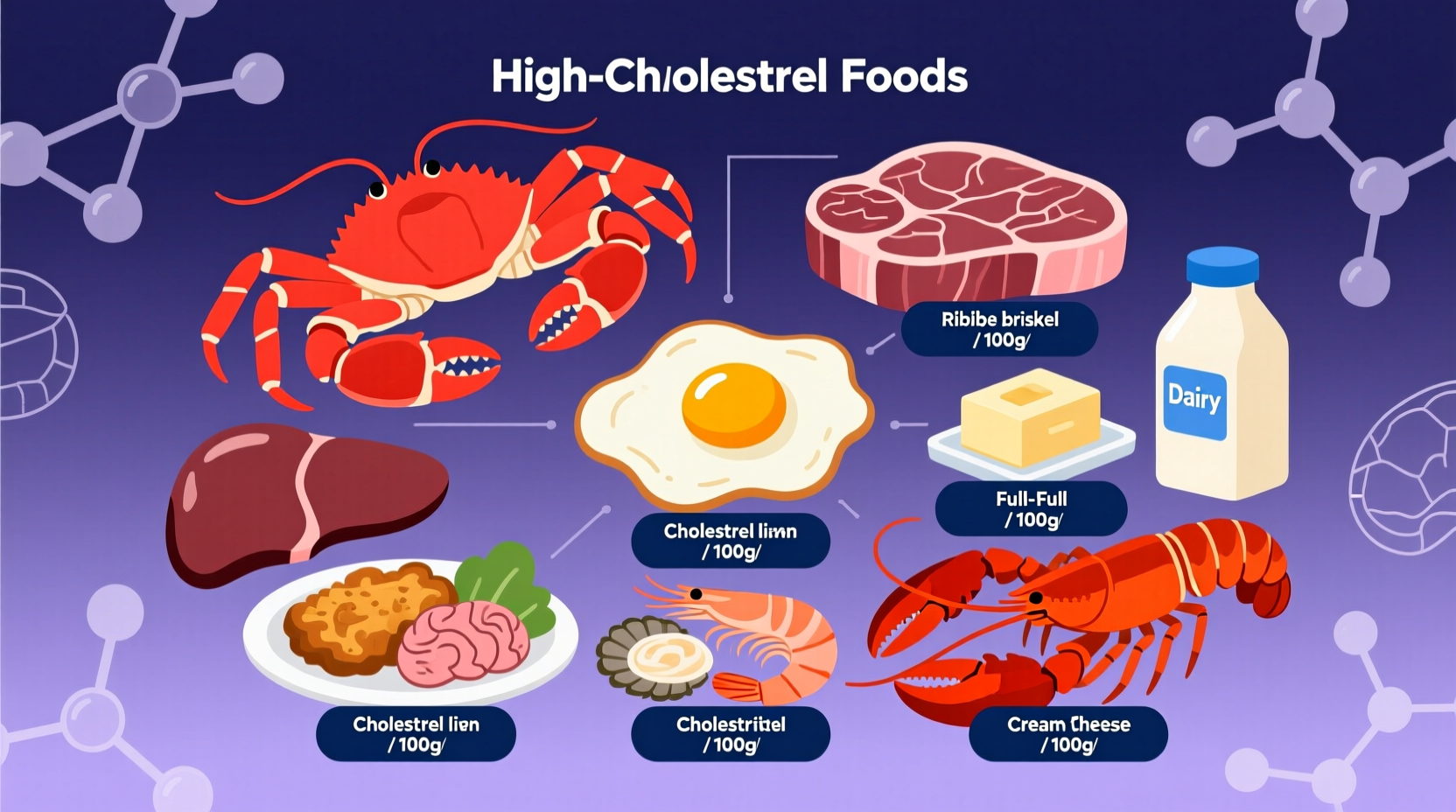Organ meats, egg yolks, full-fat dairy products, and certain seafood contain the highest levels of dietary cholesterol. A single serving of beef liver (3.5 oz) contains approximately 389 mg of cholesterol, while one large egg yolk has about 186 mg. Current research shows that for most people, dietary cholesterol has less impact on blood cholesterol than saturated and trans fats.
Understanding which foods contain high cholesterol is essential for making informed dietary choices, especially if you're monitoring your cardiovascular health. While cholesterol often gets negative attention, it's actually a vital substance your body needs for building cells and producing hormones. The key is knowing which foods contain significant amounts and how they fit into your overall diet.
Your Complete Guide to High-Cholesterol Foods
Many people mistakenly believe that all high-cholesterol foods automatically raise blood cholesterol levels. However, recent scientific understanding reveals a more nuanced picture. The relationship between dietary cholesterol and blood cholesterol varies significantly among individuals, with genetics and overall dietary patterns playing crucial roles.
What You Really Need to Know About Dietary Cholesterol
Cholesterol is found only in animal-based foods, as plants don't produce cholesterol. When evaluating high-cholesterol foods, it's important to consider the entire nutritional profile, not just cholesterol content. Foods high in saturated fats often have greater impact on blood cholesterol levels than foods high in dietary cholesterol alone.
According to the American Heart Association, most healthy adults can consume up to 300 mg of dietary cholesterol daily without significant impact on blood cholesterol levels. However, individuals with certain health conditions may need to limit intake to 200 mg per day.
Top Foods Highest in Cholesterol
While some high-cholesterol foods should be limited, others can be part of a balanced diet when consumed in moderation. The following table shows common foods with their cholesterol content per standard serving:
| Food | Serving Size | Cholesterol (mg) | Additional Notes |
|---|---|---|---|
| Beef liver | 3.5 oz (100g) | 389 | Also high in vitamin A and iron |
| Egg yolk | 1 large | 186 | Egg whites contain no cholesterol |
| Shrimp | 3.5 oz (100g) | 194 | Low in saturated fat, high in protein |
| Butter | 1 tbsp | 31 | High in saturated fat (7g per tbsp) |
| Cheddar cheese | 1 oz | 30 | Also contains protein and calcium |
| Whole milk | 1 cup | 33 | Contains essential vitamins and minerals |
This nutritional data comes from the USDA FoodData Central, the most comprehensive and scientifically verified food composition database available to the public.
How Dietary Cholesterol Understanding Has Evolved
Scientific understanding of dietary cholesterol has significantly changed over the past two decades. In the early 2000s, health guidelines recommended limiting dietary cholesterol to 200-300 mg daily. However, the 2015-2020 Dietary Guidelines for Americans removed the specific daily limit for cholesterol, noting that "available evidence shows no appreciable relationship between consumption of dietary cholesterol and serum cholesterol."
This shift occurred because research revealed that saturated fats have a much stronger impact on blood cholesterol levels than dietary cholesterol itself. For most people, the liver compensates for dietary cholesterol by producing less cholesterol internally.

When High-Cholesterol Foods Become a Concern
While dietary cholesterol alone isn't the primary concern for most people, certain high-cholesterol foods often come packaged with other problematic components. The real issue arises when high-cholesterol foods also contain significant amounts of saturated or trans fats. For example:
- Fried foods often contain both high cholesterol (from egg batter) and unhealthy trans fats
- Processed meats typically contain high cholesterol plus sodium and preservatives
- Baked goods frequently combine egg yolks with butter or shortening
According to the Mayo Clinic, individuals with diabetes, familial hypercholesterolemia, or existing heart disease may need to be more cautious with dietary cholesterol than the general population.
Smart Alternatives for Lower-Cholesterol Eating
You don't need to eliminate all high-cholesterol foods to maintain heart health. Consider these practical substitutions that maintain flavor while reducing cholesterol intake:
- Use egg whites or cholesterol-free egg substitutes instead of whole eggs
- Choose lean cuts of meat and remove visible fat before cooking
- Opt for low-fat or fat-free dairy products
- Replace butter with olive oil or avocado in recipes
- Focus on increasing plant-based proteins like beans and lentils
Remember that overall dietary patterns matter more than individual nutrients. The Mediterranean diet, rich in fruits, vegetables, whole grains, and healthy fats, has been consistently associated with better heart health outcomes regardless of moderate cholesterol intake from foods like eggs and seafood.
Practical Tips for Managing Dietary Cholesterol
Implementing sustainable changes to your diet is more effective than drastic restrictions. Try these evidence-based strategies:
- Read nutrition labels carefully, focusing on both cholesterol and saturated fat content
- Cook at home more often to control ingredients and preparation methods
- When eating out, request modifications like dressing on the side or grilled instead of fried options
- Balance higher-cholesterol meals with cholesterol-free plant-based options
- Consult with a registered dietitian for personalized guidance
For most healthy adults, enjoying eggs, shellfish, and moderate amounts of full-fat dairy can be part of a balanced diet. The key is considering these foods within your overall eating pattern rather than in isolation.
When to Seek Professional Guidance
If you have specific health concerns about cholesterol, consult with your healthcare provider or a registered dietitian. They can help interpret your blood work and provide personalized recommendations based on your health status, family history, and dietary preferences.
Remember that cholesterol management involves multiple factors beyond diet, including physical activity, weight management, and sometimes medication. A comprehensive approach yields the best results for long-term heart health.











 浙公网安备
33010002000092号
浙公网安备
33010002000092号 浙B2-20120091-4
浙B2-20120091-4